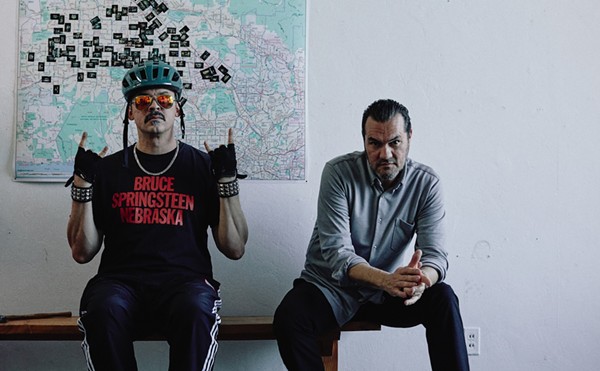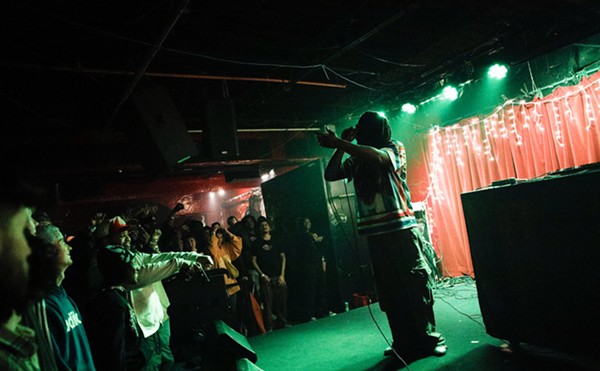Few bands have earned such a reputation for creating uncompromising, confrontational music and videos as Vancouver's Skinny Puppy did in the industrial-rock scene of the mid-'80s through the mid-'90s. The path has not been without turmoil; internal tensions led to the band's dissolution in 1995, followed by the death of keyboardist Dwayne R. Goettel. They reformed in 2000 and released The Greater Wrong of the Right in 2004 and Mythmaker in 2007. Lead singer Nivek Ogre took some time to talk about SP's past and present. — Norm Narvaja
If you ask anyone who's seen Skinny Puppy more than once, every tour has been different. What can you tell us about the upcoming In Solvent See tour?
I was thinking about the unseen face of racism in the western world — especially North America, the United States. With me coming from Canada, I'm not denigrating it, just saying what it is. I had approached this thinking I need to comment on this in some way and didn't know I was walking into it blindly, creating a costume for the background of what I felt I could touch upon. Then after about three weeks, the news stories started appearing that were validating to that concept. Another idea I'll be exploring is the idea of the real world, growing up in a natural setting, versus something just plugged into the wall. I have some really cool stuff planned and am really excited about it. I had some great people involved with it. If I can pull it off in the way I hope to, it won't be beating people over the head. It should be something very fluid and beautiful. The structural part of the performance is something I'm really excited about.
Skinny Puppy have been important to many people for 26 years. Are you surprised that something that started in British Columbia has evolved into what it is today?
Yeah, I'm absolutely shocked. The idea of me as a 23-year-old kid who couldn't sing and wrote poetry, when I was 5 and 6 growing up in Calgary, I had always fantasized about being in a studio and being a singer. I guess that was manifest destiny in some way. The idea to go in and make a record so far against the grain of what was considered popular or acceptable music at the time, that was the shit. So in a lot of ways, the music became a narrative, and the narrative became my life. There isn't a day in my life that I don't express some appreciation for how something so strange and abstract — you're talking about making lemonade out of lemons — can be so embraced by people. [It's] the same way I embraced the music I listened to — like the whole Factory Records catalog, which is something that changed me, the way they presented the music. So to be able to connect with people who say to me, "Your music really got me through a tough time," that means a lot. Because I've had artists that have done that for me, and this music has gotten me through many tough times as well. On top of that, there's a generational thing. We go on tour, do festivals in Europe, for example, where we see three generations of fans. We will see guys with full-on gray hair still all goth, with their families who are just as into it to. It's a bit cultish, a bit like the Grateful Dead, I suppose.
The period of making your final first-incarnation release, The Process, was difficult, tense and ultimately tragic with the death of Dwayne Goettel. Have you been able to go back to that record?
Oh yeah. I constantly go back to The Process, and it brings back strong memories. It was a very creative period in a lot of ways and also a quagmire, an eddy, an absolute standstill, with trying to find a person or mediator to fix everything, ending up with the death of somebody. At the same time, I found a certain rawness in the music, a very sort of at-the-moment tenseness, an explanation of sorts of what was going on with the psychology of all of us in that time period, where massive fires and earthquakes were going on. That was countered with this incredible creative drive of what we were doing online at the time, 1994-1995, where we were using a lot of BBS's and resurrected something that if you went to a [collectors'] bookstore like Brand Books in Glendale and asked about Satan's Power by William Sims Bainbridge, they'd say, "We don't talk about that here. We don't talk about The Process." We came into something where we reactivated The Process online, and they came and watched us. That was the incredible side of that project. Then there was the process of all of us moving into a place for the first time in our history and actually recording together, which was probably a mistake.
What are some of the memories you have of Dwayne?
Dwayne was engaged on all levels, a very spiritual person, very open to the experience. He was even far-reaching on the esoteric side, very into the idea of exploring his mind, not through the things that I did, but through hallucinogens and that sort of mind expansion. What always impressed me is that he never lost his shit during that. He was always sort of playful and at the same time very sensitive and looking for a family. We kind of put him in the middle of a war at that time [writing and recording The Process]. He had a very thorough understanding of music, was classically trained but was able to break that down and express himself in new ways. In a weird way, Dwayne brought a lot of cohesiveness to something very abstract and took Skinny Puppy to a new level. He was a trickster — fun, gentle, sweet. I never fully got the complete picture of Dwayne, and I wish I had time to. There were so many sides of him that I wish I could have seen.
Your fans are very diligent about getting your music and going to shows. Do you recall times where fans went above and beyond in trying to connect with you?
I think one of the most memorable things as far as striking an emotional chord with the fans was, during the time I toured with Ministry, then went onto the Too Dark Park tour, I was using an ice pick onstage to stab my arm. I got to the point in the performance that I needed to up the ante, make it more dangerous. In my mind, the performances became a car race; people go there expecting an accident to happen. I turned myself into a guinea pig of sorts. During a show at Florida's Jannus Landing, I was performing the stabbing scene, and I hit my arm way too hard and drove the ice pick up into my elbow. It was stuck, and I knew I'd done something wrong. The fans at the front, their jaws dropped open. I finished the song and had to tear it out; I was concerned I hit an artery or a vein. Luckily, I got to a hospital after the show and had my arm checked out. I got to the hotel, [and] somehow, kids got my room number and left phone messages crying, saying that I didn't have to go that far. It was an epiphany for me. As time has gone on, I realize that I don't have to go that far to be intense.
You've toured with Ministry, the Revolting Cocks, Pigface and KMFDM, who have all performed in Cleveland. Any particular memories of your times in Cleveland with those bands?
There are all the nights at Peabody's with Skinny Puppy and the Revolting Cocks. Playing with Ministry was insane everywhere, especially during the tour for The Mind Is a Terrible Thing to Taste, which had the cage set up at the front of the stage. It became all you saw, the cage separating you from the raging mass of people in front of you. I forgot where we played in Cleveland that tour, do you remember?
It was the Phantasy Theater. Prior to that, there was the gig at the Jupiter for The Land of Rape and Honey tour in 1988.
Ah, I remember the Phantasy now. The Rape and Honey tour at the Jupiter, my memory's fuzzy on that.
An acquaintance told me about that show and mentioned your performances of "Smothered Hope" and Magazine's "The Light Pours Out of Me." The main entrance was a freight elevator, if I recall.
Oh, fuck yeah! I remember that gig! The Jupiter was an awesome club. I sometimes have to rely on someone to remind me about a show so I can recall the details.
Is there anything left in the Skinny Puppy archives that you'd like to see released?
Honestly, I think that we've put out all that we think is valid. It's not something I'm really in control of. But personally, although I know it doesn't exist, I'd love to have a recording from the Too Dark Park tour with a good sound mix. It's just something I'd love to have for myself. I considered that tour the height of my career, as I was really running off that car-crash energy that I mentioned earlier.
Finally, what do you hope people walk away with when they hear a Skinny Puppy record or see you live?
I think more than anything that we try to convey the idea of changing the way one perceives things. I've always tried to rise above the propaganda that's everywhere and have always been fascinated by my own programming in this culture. If I can get people to look beyond what they normally see, then I've done my job.












